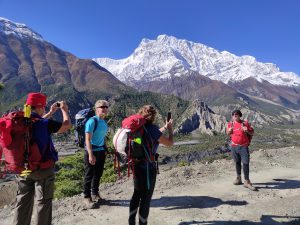
Sri Krishna Tamang, who arrived at the Tribhuvan International Airport from Dubai at around 10 pm last Saturday, stood in the immigration queue for nearly two hours. A week before, while leaving for Dubai, he endured a similar fate.
“The foreign tourists were encountering more difficulties than us. There was no one guiding them on how to fulfil the procedures,” he said. “What’s even worse is we don’t even have signboards on how to get their visas or the forms they have to fill. The TIA is chaotic.”
Naveen Pudasaini, who arrived at the airport to catch a flight to Qatar, waited in queue for almost two hours. Trapped in a dreadful queue at the airport, he feared that the plane would depart by the time he cleared immigration.
“The queue started from near the elevator on the ground floor. This paints a very bad image to tourists who come to the country,” he said. “When will the authorities address this issue?”
Former bureaucrats have also been raising this issue time and again. Shiva Prasad Nepal, a former Joint Secretary at the Ministry of Physical Infrastructure and Transport, took to social media to mention the Prime Minister’s Office and Council of Ministers, offering suggestions.
“It is evident that unless the Department of Immigration’s physical and institutional infrastructure is promptly improved, Nepal’s reputation in the international community will suffer greatly. All Nepalis and tourists were left disappointed for having to spend two to three hours at the departure and arrival counters,” he wrote, adding, “It is not the act that best suits a country that prioritises tourism and touristic activities; it demands prompt attention.”
Lack of staff, says TIA

The immigration office at Tribhuvan International Airport has been complaining about insufficient staff on the ground, hence, creating service delivery issues.
The government has assigned a total of 129 immigration officers, but currently, only 90 officials are on duty. However, the issue extends beyond staffing numbers.
Gogan Bahadur Hamal, Chief Immigration Officer at TIA, highlights that the service faces increased pressure during night hours when the airport handles six flights per hour. He notes that only 14 immigration officers can be stationed at the departure desk, leaving no room for additional desks.
“Even if all 14 officers work swiftly, they can process immigration for approximately 1,000 passengers per hour,” he says. “Yet, during peak hours, around 1,800 passengers are queued up, and the airport lacks sufficient space to accommodate more desks.”
This, Hamal says, is the reason why people have to queue up to two hours.
He explained that although there are 22 desks on the arrival side, only 10 desks can be staffed at night. “The ministry has started deploying more officers,” Hamal says. “After filling the vacancies, services can be provided from all 22 desks.”
Currently, there are more officers than available posts in the Ministry of Home Affairs, National Disaster Risk Reduction and Management Authority (NDRRMA), and Department of Prison Management (DoPM). However, despite efforts to reduce staff numbers in these ministries and departments, they have failed to provide adequate personnel to deliver essential services.
Given that immigration is an essential service, providing service becomes more challenging when there is a shortage of staff. There is a lack of officers who check and stamp passports at the airport.
Hamal restates that efforts are underway to fill vacancies, and the issue of long queues at arrivals can be resolved soon.
Issues abound with leaderless department

Krishna Bahadur Katuwal has assumed the role of acting Director General of the Department of Immigration following the suspension of the then Director General Rudra Singh Tamang due to a corruption case related to the Melamchi water project. The Commission for the Investigation of Abuse of Authority (CIAA) filed a case against Tamang in a special court on February 18.
For a month thereafter, there has been no one in the position. Katuwal has been carrying out the responsibilities as an acting director general. However, due to the Department’s reliance on officials, various immigration-related issues have not been adequately addressed from a political standpoint.
Prem Prasad Dahal, the director and information officer of the department, stated that despite not having a director-general, the department’s regular operations and service delivery have continued without interruption or problems.
“There have been no disruptions in our regular service delivery,” he said.
Before Tamang, the department had initiated several policy reforms to enhance the effectiveness of the immigration service. However, even after these efforts, there were preparations to revoke various decisions made by the department and implement new ones.
Following a decision issued by the home secretary in 2021, the department coordinated efforts to annul the 17-point criteria concerning visit visas and introduce new, simpler six-point criteria. Subsequently, the inconvenience faced by visitors at the airport has been significantly reduced.
Officials assert that by adhering to these standards, immigration staff have also contributed to discouraging illegal extortion at the airport.
To enhance the effectiveness of the e-visa service, which the department launched on February 9, 2023, the immigration service was initiated from February 13, 2023, operating from 8 am to 8 pm seven days a week. Despite these reform efforts, progress has now come to a halt.
During this period, the department formally notified the Ministry of Home Affairs, the State Affairs Committee and the Good Governance Committee of the Parliament about various policy arrangement challenges. The report submitted by the department to the parliamentary committees highlighted the difficulties faced by long-term foreign residents engaged in various social services in Nepal due to visa restrictions.
The department also raised concerns with both the parliament and the government regarding the deportation of some foreigners engaged in social work in Nepal.
“Some foreigners have been in the custody of Nepali prisons and immigration authorities for a long time because they have not paid visa fees and fines for deportation when they have overstayed their visas in Nepal,” the department said in the report.
“The government must take care of them while here. In this regard, it seems that an agreement needs to be made at the diplomatic level based on reciprocity, and arrangements should be made for easy deportation.”
Similarly, the department concluded that there is a problem due to the lack of clarity regarding the visa fee for foreigners of Nepali origin who have acquired resident Nepali citizenship. Currently, there is a provision in the Immigration Act (1992) that visa fees are not charged to non-resident Nepalis who have an identity card. However, there needs to be clarity as to what to do as there is no mention of non-resident Nepali citizenship holders in the Act.
The department has been giving recommendations that the system of issuing only tourist visas at entry points in Nepal should be amended. The department suggests that visa distribution should be simplified and organised by adding study visas, worker visas, retirement visas, medical visas, religious visas, sports visas, and other types of visas at the point of entry.
The current visa system for religious personnel is unclear. Monks from international monasteries in Lumbini are currently being issued work visas.
The report also raises concerns about individuals born in Nepal to foreign parents. The lack of clear regulations regarding their entry visas and departures abroad creates a situation where they essentially live as non-citizens.
Furthermore, the department highlights the issue of hundreds of foreign nationals residing in Nepal with unclear legal status. This includes those who entered illegally, refugees, and individuals facing complexities transferring to other countries. A dilemma exists regarding whether foreign nationals on marriage visas can work in Nepal based on their marital status to Nepali citizens.
Meanwhile, according to the department, foreigners entering for sports require work visas, while those seeking ayurvedic treatment receive tourist visas. These inconsistencies highlight the need for a revised visa framework.
The department believes that the focus on immigration departures has overshadowed attention to foreign arrivals, potentially compromising national security. Therefore, the department advocates for increased monitoring of foreign arrivals. To achieve this, it recommends full automation of international airports and the improvement of infrastructure to enhance the organisation of land crossings. Additionally, the department proposes the installation of a technology-based automated border security system (e-gate).
The department notes that the movement of third-country citizens has been impeded by the non-functioning of some immigration offices at the border with India. Specifically, Pashupatinagar in Ilam and Mohana entry point in Kailali are reported as not yet operational.
Kakadvitta, Biratnagar, and Nepalgunj are only partially operational. Diplomatic initiatives have been initiated to address such issues, but a lack of leadership hampers progress. Although the Korala border crossing to Tibet is operational, the lack of an immigration office has delayed its establishment.
Despite the need to cater to a large number of passengers, there is a shortage of manpower in the immigration offices. Policy and institutional issues that require attention are at a standstill due to the absence of a director general. Concurrently, the shortage of staff has exacerbated service delivery problems at the international airport.


























